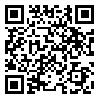Volume 11, Issue 2 (2-2024)
JRH 2024, 11(2): 0-0 |
Back to browse issues page
Master of psychology, Azad university of zanjan, Zanjan, Iran
Abstract: (346 Views)
Background and purpose: Considering the available evidence regarding the impact of emotion regulation and impulsivity during adolescence, trying to find its underlying processes has become very important. Since religious belief is one of the factors closely related to emotion regulation and impulsivity, the aim of the present study was to investigate the relationship between religious beliefs and emotion regulation and impulsivity in students.
Materials and methods: This study was descriptive-correlational. 368 people (193 girls and 175 boys) students of the first secondary level of Hamedan city in 1401-1402 were selected by cluster sampling method, and they were tested on Bart's impulsivity questionnaires (BIS-11), emotional regulation (EPQ) by Gross and John. And George's religious belief answered. The data were analyzed by Pearson's correlation coefficient statistical index and spss version 22 software.
Results: The results of the correlation coefficient showed that there is a significant positive relationship between religious belief and emotion regulation (r=0.37, p<0.01), and there is a significant negative relationship between religious belief and impulsivity (r=0.65, p<0.01).
Conclusion: The results of this research show that religious belief can play a role in regulating emotions and reducing impulsiveness in teenagers.
Type of Study: Original Research |
Subject:
روانشناسی
| Rights and permissions | |
 |
This work is licensed under a Creative Commons Attribution-NonCommercial 4.0 International License. |



